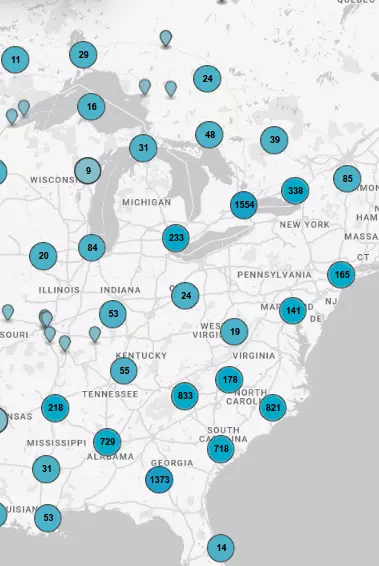Hungarian Colony
In 1888, three wine-making communities were founded here on some 2000 acres. A local land developer, Ralph L. Spencer, invited some 200 Hungarian wine-making families to settle this region. They...
- lat34
Historic Tallapoosa
Tallapoosa was a place of great ceremonial importance to the Indians. Here in 1826 settlers discovered ´Charles Town,´ an Indian Village named for one of their great warriors. Several...
- lat34
Haralson County
This County, created by Act of the Legislature Jan. 26, 1856, is named for Gen. Hugh A. Haralson, Member of Congress and Chairman of the Committee on Military Affairs during the Mexican War....
- lat34
Sparta Cemetery
The main cemetery in Sparta was established on property deeded to the town in 1806. Burials illustrate a common nineteenth-century pattern of migration to the area, as settlers from New England...
- lat34
Camilla and Zack Hubert Homesite
Zack Hubert, a former Warren County slave, moved here with his family in 1871. The Huberts were among the first African-American landowners in central Georgia and played influential roles in the...
- lat34
"July" 1858 The Original July Foxhound
In July 1858 an Irish Foxhound arrived in Georgia as a gift from the noted hunter, Nimrod Gosnell of Roxbury Mills, Maryland, to Colonel Miles G. Harris of Hancock County. the male puppy was...
- lat34
Gov. William Rabun
The home of William Rabun, Governor of Georgia 1817-1819. Governor Raburn moved to Wilkes Co., Ga., in 1785. Having the unusual backwoods schooling of his day, he acquired by reading...
- lat34
Gov. Charles James McDonald
4.2 mi. In this area stood the home of Charles James McDonald, elected Governor of Georgia in 1839 and 1841. "Fearless and guided by practical wisdom and integrity," he was Solicitor-general...
- lat34
Gov. William Jonathan Northen
William Jonathan Northen, Governor of Georgia from 1890 to 1894, lived in this house. Born in Jones County, July 9, 1835 of Scotch ancestry, Governor Northen graduated from Mercer University....
- lat34
Shoulder-bone Creek Treaty
Near the mouth of Shoulder-bone Creek on the banks of the Oconee River a treaty of "amity, peace and commerce" was signed by eight commissioners representing the State of Georgia and 59 head...
- lat34
Sparta
Sparta, Seat of Justice for Hancock County in 1795, became a chartered town, Dec. 3, 1803. Situated at an Indian trading post, in constant danger of border trouble, the town was named Sparta to...
- lat34
Hancock County
Hancock County, created by Act of Dec. 17, 1793, was named for John Hancock of Mass., President of Continental Congress and the first man to sign the Declaration of Independence. It has been the...
- lat34
Old Eagle Tavern
The Eagle Tavern, built in the late 18th century, once stood on the site of the present Lafayette Hotel. A state coach stop on the Augusta to Macon line, the tavern owned by a Mr. A. Abercrombie...
- lat34
Nathan S.S. Beman at Mt. Zion
NATHAN S. S. BEMAN AT MT. ZION (Nov. 26, 1785 - Aug. 6, 1871) Nathan Sidney Beman, Presbyterian minister, educator, editor, college President, after graduating from Middlebury College,...
- lat34
Rockby
About 1 mi. from here, Richard Malcolm Johnston, lawyer, educator, and author, operated Rockby, a school for boys revolutionary in its day. Disgusted with the harsh disciplinary methods of the...
- lat34
Powelton Baptist Church
In this church on this site the General Baptist Association of Georgia was organized June 27, 1822, by messengers from the Georgia and Ocmulgee Associations, and certain other Baptists, including...
- lat34
Powelton Baptist Church
The Powellton Baptist Church, first known as Powell´s Creek Church, was constituted July 1st, 1786, with 26 Members by the Rev. Silas Mercer, the Rev. John Harvey, And the Rev. John Thomas. The...
- lat34
Pierce Memorial Methodist Church
The first regular appointment for Sparta as a preaching place on a circuit was in 1799 with George Dougherty, one of the great preachers of the period as pastor. In 1802, Bishop Francis Asbury...
- lat34
Famous Indian Trail
The Upper Trading Path, one of the historic Indian ways of the Southeast, passed here, leading westward from present Augusta to tribes as far away as the Mississippi River. By various connections...
- lat34
The Flowery Branch Depot
Cotton, leather and furniture, as well as manufactured items from the region passed through these walls, as did passengers during its working years (c.1890-1970s) as a Richmond & Danville Railroad...
- lat34
